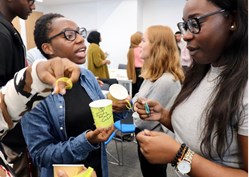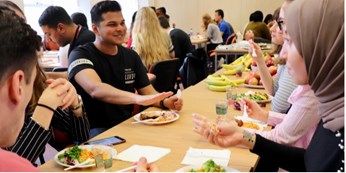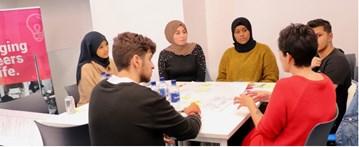Group Size
?
1.) Small group (teams of 4-6)
2.) Individual Task
3.) Large Group
4.) Any
Small group (teams of 4-6)
Learning Environment
?
1.) Lecture Theatre
2.) Presentation Space
3.) Carousel Tables (small working group)
4.) Any
5.) Outside
6.) Special
Presentation Space, Carousel Tables (small working group)
QAA Enterprise Theme(s)
?
1.) Creativity and Innovation
2.) Opportunity recognition, creation and evaluation
3.) Decision making supported by critical analysis and judgement
4.) Implementation of ideas through leadership and management
5.) Reflection and Action
6.) Interpersonal Skills
7.) Communication and Strategy
1Creativity and Innovation
2Opportunity recognition‚ creation and evaluation
4Implementation of ideas through leadership and management
6Interpersonal Skills
7Communication and Strategy
Birmingham Youth Challenge was a 50-person hackathon-style event, centred on one of the key challenges facing the region as identified in the West Midlands combined Authority’s Urban Challenge, set by Mayor Andy Street. The event was widely promoted by encouraging students to’ Join us for a weekend of creative problem-solving to build a better future for Birmingham’s young people’. The event was run in collaboration with Barnado’s, one of Santander’s charity partners. On the Friday evening Martin Howard of Barnado’s gave a keynote which was followed by panel session featuring three local social enterprises and charities supporting young people. This event was open for anyone to attend and over 150 students, staff and representatives from the local community attended. Mark Corbett of Edvent, who were facilitating the event, gave a briefing on the format of the weekend followed by networking drinks and refreshments provided by The Green Sisters a startup supported by BSEEN.
The challenge itself begins with an Ideation and Creative Problem-Solving workshop, involving divergent and convergent thinking. The students then pitch their ideas and vote for their favourites forming teams of 5. After lunch the 24-hour countdown begins!
(We chose not to run the event overnight as it excludes students who are unable to stay overnight).
Additional workshops to help students develop their idea include sessions on the business model canvas and lean startup methodology.
We invited a range of aspirational but relatable mentors to support the event, working their way around the groups, listening to the ideas and offering advice and guidance where it is sought.
The Sunday morning starts with a pitching masterclass followed by another mentor walkaround, while the teams craft their pitches. The challenge ends at lunchtime, and afterwards each team gives a 5-minute pitch.
A panel of expert judges used a judging matrix of six areas to appraise each of the teams. This included evaluating the innovative aspect of the idea; its business model and vision; its impact on the region and certain communities; the role technology plays in the business; the customer validation undertaken and the quality of the pitch and demo. The winners and runners up are announced, prizes awarded, and certificates provided to everyone who completed the challenge. Online feedback forms were sent to each participant and the results evaluated.
The impact was significant as the 50 students who took part experienced what it is like in a start-up environment, allowing them to develop key skills that will enhance their employability.
Hackathon-style events are very popular with students as they’re fun, fast-paced, encourage collaboration and there are clear incentives around learning/developing skills and the prizes are attractive as well.
The event helped students from a WP background to increase their social capital by engaging with the mentors, judges and facilitators at the event.
36% of the students who engaged were not from the business school, a much higher percentage than our more mainstream startup events.
100% of the participants said they were inspired to explore entrepreneurship after the event, when only 16% said they attended for that reason. 47% of participants engaged with a follow-on programme.
Some student feedback from the event includes:
“The Birmingham Youth Challenge taught me skills I didn’t realise I needed!”
“It allowed me to meet like-0minded students that care about change.”
“I learnt about the process of coming up with good ideas, and how collaborating with others is a key component of that.”
“It was fun, engaging and though provoking. My eyes have been opened!”


